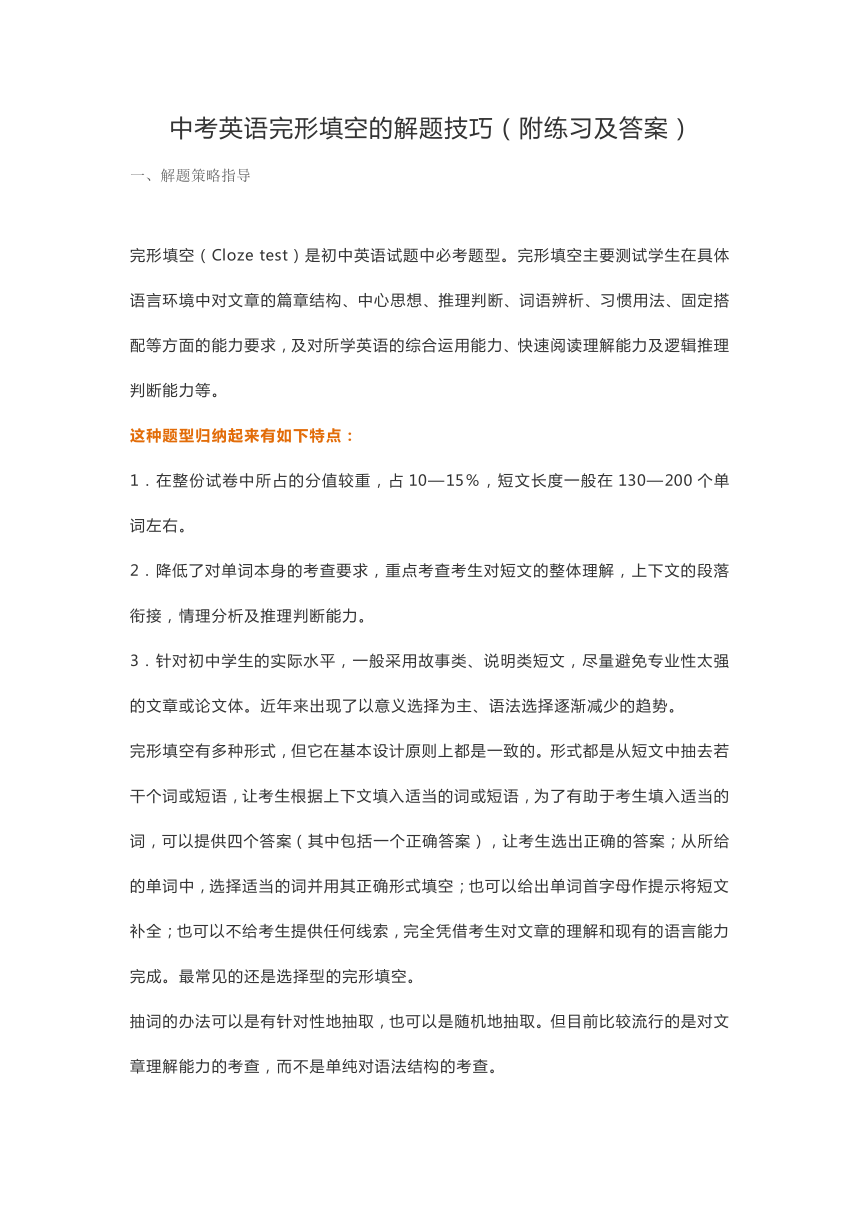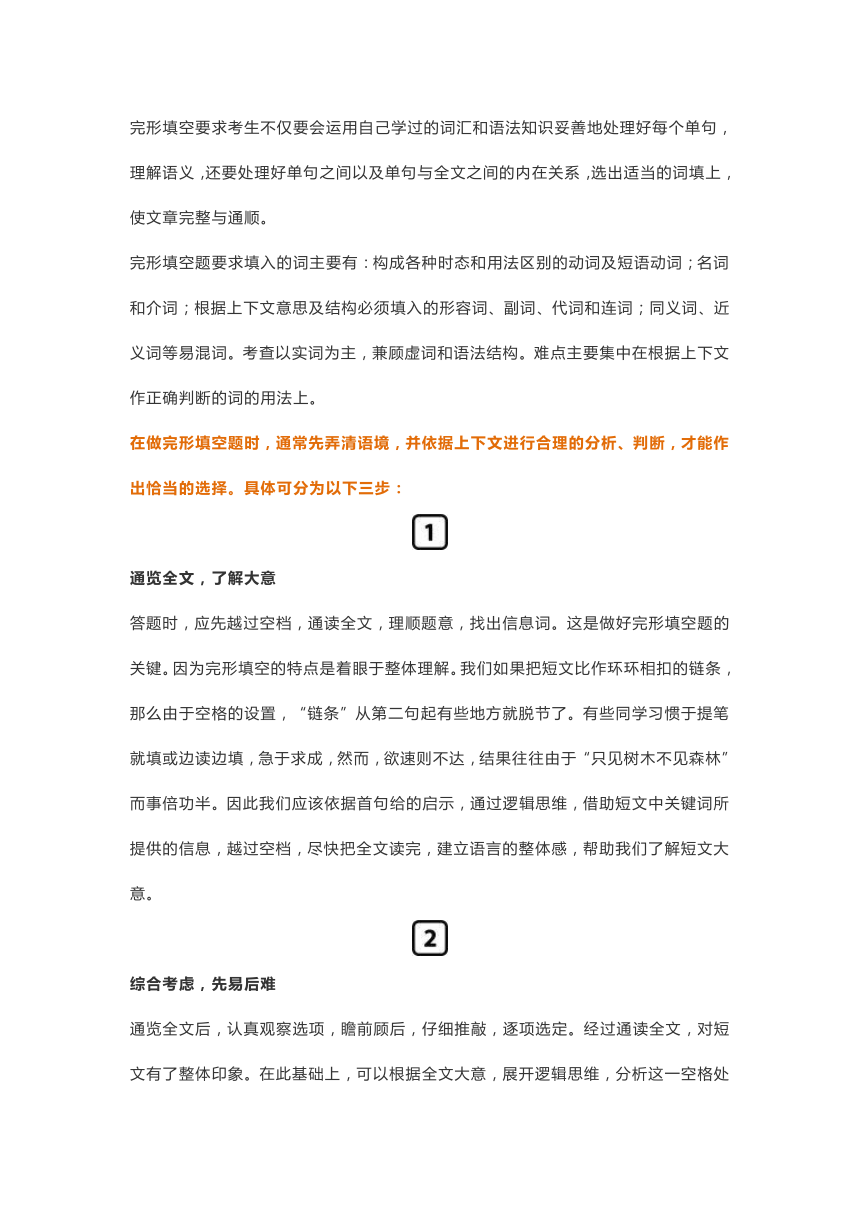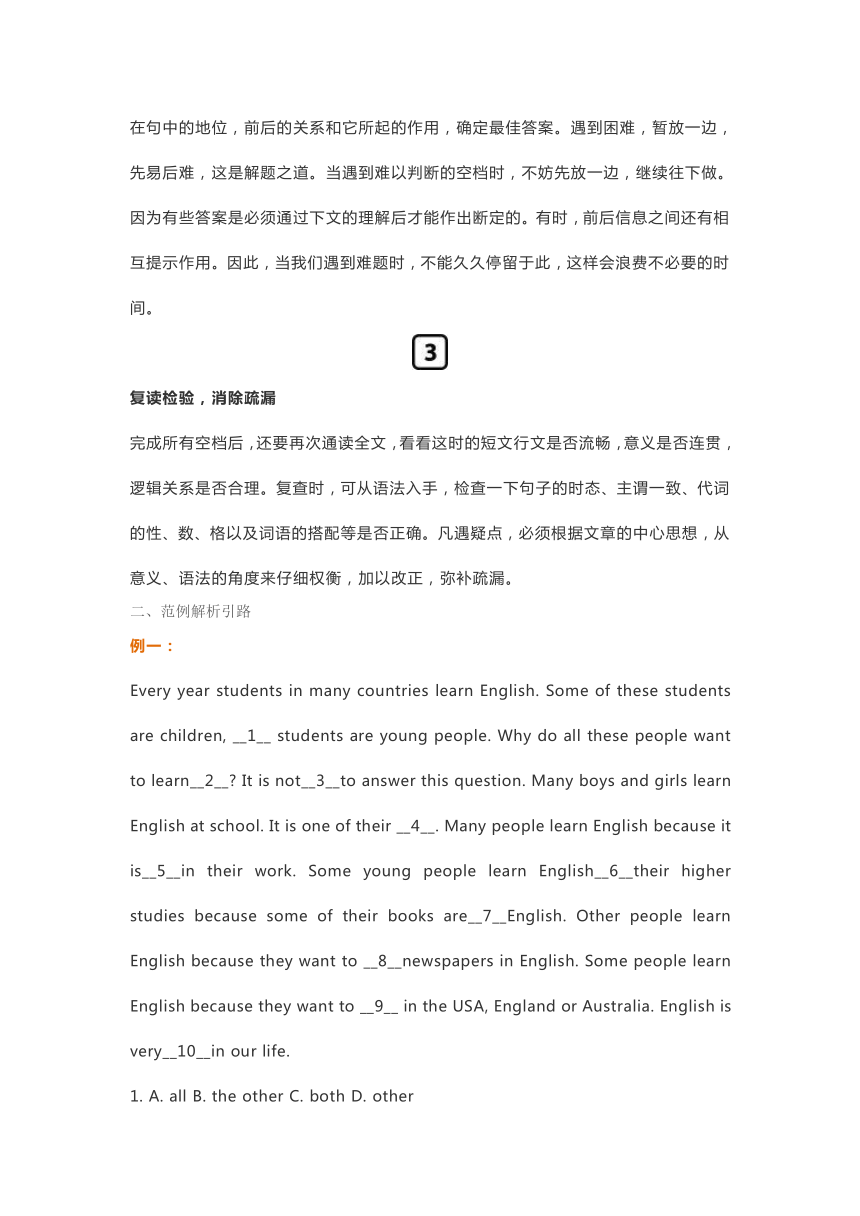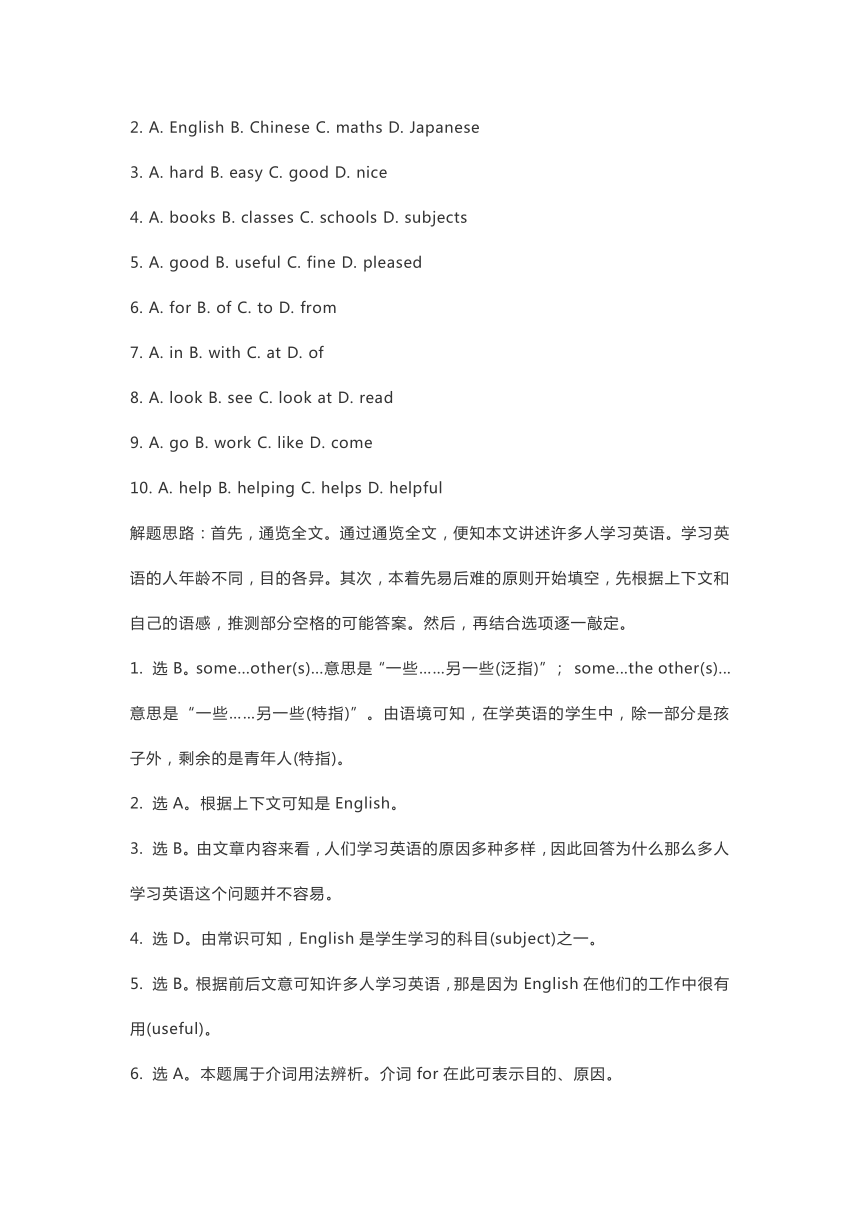2019中考英语完形填空的解题技巧(附练习及答案)
文档属性
| 名称 | 2019中考英语完形填空的解题技巧(附练习及答案) |

|
|
| 格式 | zip | ||
| 文件大小 | 18.3KB | ||
| 资源类型 | 教案 | ||
| 版本资源 | 通用版 | ||
| 科目 | 英语 | ||
| 更新时间 | 2019-06-03 00:00:00 | ||
图片预览




文档简介
中考英语完形填空的解题技巧(附练习及答案)
一、解题策略指导
完形填空(Cloze test)是初中英语试题中必考题型。完形填空主要测试学生在具体语言环境中对文章的篇章结构、中心思想、推理判断、词语辨析、习惯用法、固定搭配等方面的能力要求,及对所学英语的综合运用能力、快速阅读理解能力及逻辑推理判断能力等。
这种题型归纳起来有如下特点:
1.在整份试卷中所占的分值较重,占10—15%,短文长度一般在130—200个单词左右。
2.降低了对单词本身的考查要求,重点考查考生对短文的整体理解,上下文的段落衔接,情理分析及推理判断能力。
3.针对初中学生的实际水平,一般采用故事类、说明类短文,尽量避免专业性太强的文章或论文体。近年来出现了以意义选择为主、语法选择逐渐减少的趋势。
完形填空有多种形式,但它在基本设计原则上都是一致的。形式都是从短文中抽去若干个词或短语,让考生根据上下文填入适当的词或短语,为了有助于考生填入适当的词,可以提供四个答案(其中包括一个正确答案),让考生选出正确的答案;从所给的单词中,选择适当的词并用其正确形式填空;也可以给出单词首字母作提示将短文补全;也可以不给考生提供任何线索,完全凭借考生对文章的理解和现有的语言能力完成。最常见的还是选择型的完形填空。
抽词的办法可以是有针对性地抽取,也可以是随机地抽取。但目前比较流行的是对文章理解能力的考查,而不是单纯对语法结构的考查。
完形填空要求考生不仅要会运用自己学过的词汇和语法知识妥善地处理好每个单句,理解语义,还要处理好单句之间以及单句与全文之间的内在关系,选出适当的词填上,使文章完整与通顺。
完形填空题要求填入的词主要有:构成各种时态和用法区别的动词及短语动词;名词和介词;根据上下文意思及结构必须填入的形容词、副词、代词和连词;同义词、近义词等易混词。考查以实词为主,兼顾虚词和语法结构。难点主要集中在根据上下文作正确判断的词的用法上。
在做完形填空题时,通常先弄清语境,并依据上下文进行合理的分析、判断,才能作出恰当的选择。具体可分为以下三步:
通览全文,了解大意
答题时,应先越过空档,通读全文,理顺题意,找出信息词。这是做好完形填空题的关键。因为完形填空的特点是着眼于整体理解。我们如果把短文比作环环相扣的链条,那么由于空格的设置,“链条”从第二句起有些地方就脱节了。有些同学习惯于提笔就填或边读边填,急于求成,然而,欲速则不达,结果往往由于“只见树木不见森林”而事倍功半。因此我们应该依据首句给的启示,通过逻辑思维,借助短文中关键词所提供的信息,越过空档,尽快把全文读完,建立语言的整体感,帮助我们了解短文大意。
综合考虑,先易后难
通览全文后,认真观察选项,瞻前顾后,仔细推敲,逐项选定。经过通读全文,对短文有了整体印象。在此基础上,可以根据全文大意,展开逻辑思维,分析这一空格处在句中的地位,前后的关系和它所起的作用,确定最佳答案。遇到困难,暂放一边,先易后难,这是解题之道。当遇到难以判断的空档时,不妨先放一边,继续往下做。因为有些答案是必须通过下文的理解后才能作出断定的。有时,前后信息之间还有相互提示作用。因此,当我们遇到难题时,不能久久停留于此,这样会浪费不必要的时间。
复读检验,消除疏漏
完成所有空档后,还要再次通读全文,看看这时的短文行文是否流畅,意义是否连贯,逻辑关系是否合理。复查时,可从语法入手,检查一下句子的时态、主谓一致、代词的性、数、格以及词语的搭配等是否正确。凡遇疑点,必须根据文章的中心思想,从意义、语法的角度来仔细权衡,加以改正,弥补疏漏。
二、范例解析引路
例一:
Every year students in many countries learn English. Some of these students are children, __1__ students are young people. Why do all these people want to learn__2__? It is not__3__to answer this question. Many boys and girls learn English at school. It is one of their __4__. Many people learn English because it is__5__in their work. Some young people learn English__6__their higher studies because some of their books are__7__English. Other people learn English because they want to __8__newspapers in English. Some people learn English because they want to __9__ in the USA, England or Australia. English is very__10__in our life.
1. A. all B. the other C. both D. other
2. A. English B. Chinese C. maths D. Japanese
3. A. hard B. easy C. good D. nice
4. A. books B. classes C. schools D. subjects
5. A. good B. useful C. fine D. pleased
6. A. for B. of C. to D. from
7. A. in B. with C. at D. of
8. A. look B. see C. look at D. read
9. A. go B. work C. like D. come
10. A. help B. helping C. helps D. helpful
解题思路:首先,通览全文。通过通览全文,便知本文讲述许多人学习英语。学习英语的人年龄不同,目的各异。其次,本着先易后难的原则开始填空,先根据上下文和自己的语感,推测部分空格的可能答案。然后,再结合选项逐一敲定。
1. 选B。some...other(s)...意思是“一些……另一些(泛指)”; some...the other(s)...意思是“一些……另一些(特指)”。由语境可知,在学英语的学生中,除一部分是孩子外,剩余的是青年人(特指)。
2. 选A。根据上下文可知是English。
3. 选B。由文章内容来看,人们学习英语的原因多种多样,因此回答为什么那么多人学习英语这个问题并不容易。
4. 选D。由常识可知,English是学生学习的科目(subject)之一。
5. 选B。根据前后文意可知许多人学习英语,那是因为English在他们的工作中很有用(useful)。
6. 选A。本题属于介词用法辨析。介词for在此可表示目的、原因。
7. 选A。in English是习惯搭配。
8. 选D。“读报”英语习惯说read newspapers。
9. 选B。根据语境及句子结构,有些人学习英语或想出国(go to a country)或想在这些国家工作(work in a country)。
10. 选D。末句点题,"英语在我们生活中是很有帮助的(helpful)"。
最后,复读检验。将所有答案代入空格后,重新将短文复读一遍,如果语句通顺,语意清楚,便结束本题,转做其它试题。
最后须提醒大家一点,做好完形填空题并非一日之功。我们应从平日学习中做起,多积累,勤学苦练,方可成功!
例二:
parent, tell, call, celebrate, together, why, start, after, shop, newspaper
Most people buy lots of presents just before Christmas. But some people think we buy too much. They have started a special day (1) _______ Buy Nothing Day. They don’t want anyone to go (2) _______ on that day. Buy Nothing Day is November 29. It is (3) _______ Thanksgiving. Often, before Christmas we see many ads in (4) _______ and on TV (5) _________ us to “buy, buy, buy!” The idea for Buy Nothing Day (6) _______ in Vancouver, Canada. Now people all over the world (7) _______ Buy Nothing Day. In California, the US, (8) _________ and children get (9) _______ to read stories, sing songs, and draw pictures. The children talk about (10) _______ they don’t need a lot of toys.
本文是向考生介绍一个特殊的日子——Buy Nothing Day,因此第1空应填called。既然是Buy Nothing Day,那就应该是不让人们“购物 (go shopping)”。第3空考查常识,Buy Nothing Day的日期是November 29,应该在Thanksgiving之后,故此空白处应填after。“看见广告”通常应在报纸上或电视上,因此第4空白处应填newspapers。结合文意可知第5空白处应填写一个动词,并且能用动词不定式作复合宾语,此动词应是tell,此处应用“动词-ing”形式,即telling。 第6空白处所在的句子是介绍Buy Nothing Day的起源,是过去的事情,应用started。现在,世界各地也像庆祝其他节日一样来庆祝Buy Nothing Day,因此第7个空白处应填写celebrate (庆祝)。第8空白处应填parents与children对应。第9空白处应填together与动词get构成get together短语,意思是“团聚”。第10空白处应填why来澄清“they don’t need a lot of toys”的原因。
完形填空实战练习带答案
完形填空(一)
The purpose(目的)of students 1 come to school is to study. But 2 needs right way or we would waste the time or the money. The followings are ways for studying.
The 3 time for reading is morning. Because in the morning, the air is fresh and our minds are clear. For that reason, we can get good results.
When we study we must be patient(有耐性的). If we don’t understand a text well, we must read it again. We should not read the next 4 we have learned the first one well.
When we are studying, we must put our hearts 5 the book. We cannot read absent-mindedly(心不在焉地), or we could get 6 from the book while we are reading.
We must always ask “why”. If it is not 7 understood, write it down and ask our teachers or parents, brothers or friends, in 8 possible way. We must know it completely and then our knowledge can 9 well.
Though there are many ways for studying, 10 , the above mentioned(提到的)will be quite enough if we can keep them in heart.
( )1.A.who
B. whose
C. which
D. they
( )2.A.studies
B. be studying
C. to study
D.studied
( )3.A.good
B. better
C. best
D.bad
( )4.A.as
B. until
C.after
D.if
( )5.A.in
B. into
C.to
D.on
( )6.A.something
B. anything
C.everything
D.nothing
( )7.A.well
B. good
C.nice
D.true
( )8.A.some
B. any
C.a
D.many
( )9.A.use
B. used
C.been use
D.be used
( )10.A.but
B. however
C.how
D.still
(二)
Mr Brown was a rich shopkeeper. He 1 a lot of money to his son Jim when he was dying. The young man often 2 his friends to dinner and several years later he spent all the money on the 3 food. Now he got into trouble and nobody came to him. It made him 4 and he went to ask a clever old man for advice.
“My money has 5 and my friends have gone,” said the young man. “What will happen to me now?”
“Don,t 6 , young man,” answered the old man. “Everything will soon be all right again. 7 and you will soon feel much happier.” 8 this, the young man was very glad. He asked, “Am I going to be 9 again if I don’t like working?”
“No,”said the old man.“I 10 you will soon get used to being poor and having no friends.”
( )1.A.lent
B.left
C.borrowed
D.got
( )2.A.made
B.hoped
C.asked
D.pulled
( )3.A.common
B.cheap
C.terrible
D.delicious
( )4. A.sad
B.happy
C.polite
D.careful
( )5.A.begun
B.been used up
C.hurried
D.flown
( )6. A.worry
B.say
C.smile
D.sing
( )7. A.Stand
B.Study
C.Work
D.Wait
( )8. A.Seeing
B.Touching
C.Hearing
D.Feeling
( )9. A.safe
B.dangerous
C.rich
D.poor
( )10.A.think
B.wish
C.understand
D.surprise
参考答案
完形填空(一) 1—5 ACCBB 6—10 DABDB
完形填空(二) 1—5 BCDAB 6—10 ACCCA
一、解题策略指导
完形填空(Cloze test)是初中英语试题中必考题型。完形填空主要测试学生在具体语言环境中对文章的篇章结构、中心思想、推理判断、词语辨析、习惯用法、固定搭配等方面的能力要求,及对所学英语的综合运用能力、快速阅读理解能力及逻辑推理判断能力等。
这种题型归纳起来有如下特点:
1.在整份试卷中所占的分值较重,占10—15%,短文长度一般在130—200个单词左右。
2.降低了对单词本身的考查要求,重点考查考生对短文的整体理解,上下文的段落衔接,情理分析及推理判断能力。
3.针对初中学生的实际水平,一般采用故事类、说明类短文,尽量避免专业性太强的文章或论文体。近年来出现了以意义选择为主、语法选择逐渐减少的趋势。
完形填空有多种形式,但它在基本设计原则上都是一致的。形式都是从短文中抽去若干个词或短语,让考生根据上下文填入适当的词或短语,为了有助于考生填入适当的词,可以提供四个答案(其中包括一个正确答案),让考生选出正确的答案;从所给的单词中,选择适当的词并用其正确形式填空;也可以给出单词首字母作提示将短文补全;也可以不给考生提供任何线索,完全凭借考生对文章的理解和现有的语言能力完成。最常见的还是选择型的完形填空。
抽词的办法可以是有针对性地抽取,也可以是随机地抽取。但目前比较流行的是对文章理解能力的考查,而不是单纯对语法结构的考查。
完形填空要求考生不仅要会运用自己学过的词汇和语法知识妥善地处理好每个单句,理解语义,还要处理好单句之间以及单句与全文之间的内在关系,选出适当的词填上,使文章完整与通顺。
完形填空题要求填入的词主要有:构成各种时态和用法区别的动词及短语动词;名词和介词;根据上下文意思及结构必须填入的形容词、副词、代词和连词;同义词、近义词等易混词。考查以实词为主,兼顾虚词和语法结构。难点主要集中在根据上下文作正确判断的词的用法上。
在做完形填空题时,通常先弄清语境,并依据上下文进行合理的分析、判断,才能作出恰当的选择。具体可分为以下三步:
通览全文,了解大意
答题时,应先越过空档,通读全文,理顺题意,找出信息词。这是做好完形填空题的关键。因为完形填空的特点是着眼于整体理解。我们如果把短文比作环环相扣的链条,那么由于空格的设置,“链条”从第二句起有些地方就脱节了。有些同学习惯于提笔就填或边读边填,急于求成,然而,欲速则不达,结果往往由于“只见树木不见森林”而事倍功半。因此我们应该依据首句给的启示,通过逻辑思维,借助短文中关键词所提供的信息,越过空档,尽快把全文读完,建立语言的整体感,帮助我们了解短文大意。
综合考虑,先易后难
通览全文后,认真观察选项,瞻前顾后,仔细推敲,逐项选定。经过通读全文,对短文有了整体印象。在此基础上,可以根据全文大意,展开逻辑思维,分析这一空格处在句中的地位,前后的关系和它所起的作用,确定最佳答案。遇到困难,暂放一边,先易后难,这是解题之道。当遇到难以判断的空档时,不妨先放一边,继续往下做。因为有些答案是必须通过下文的理解后才能作出断定的。有时,前后信息之间还有相互提示作用。因此,当我们遇到难题时,不能久久停留于此,这样会浪费不必要的时间。
复读检验,消除疏漏
完成所有空档后,还要再次通读全文,看看这时的短文行文是否流畅,意义是否连贯,逻辑关系是否合理。复查时,可从语法入手,检查一下句子的时态、主谓一致、代词的性、数、格以及词语的搭配等是否正确。凡遇疑点,必须根据文章的中心思想,从意义、语法的角度来仔细权衡,加以改正,弥补疏漏。
二、范例解析引路
例一:
Every year students in many countries learn English. Some of these students are children, __1__ students are young people. Why do all these people want to learn__2__? It is not__3__to answer this question. Many boys and girls learn English at school. It is one of their __4__. Many people learn English because it is__5__in their work. Some young people learn English__6__their higher studies because some of their books are__7__English. Other people learn English because they want to __8__newspapers in English. Some people learn English because they want to __9__ in the USA, England or Australia. English is very__10__in our life.
1. A. all B. the other C. both D. other
2. A. English B. Chinese C. maths D. Japanese
3. A. hard B. easy C. good D. nice
4. A. books B. classes C. schools D. subjects
5. A. good B. useful C. fine D. pleased
6. A. for B. of C. to D. from
7. A. in B. with C. at D. of
8. A. look B. see C. look at D. read
9. A. go B. work C. like D. come
10. A. help B. helping C. helps D. helpful
解题思路:首先,通览全文。通过通览全文,便知本文讲述许多人学习英语。学习英语的人年龄不同,目的各异。其次,本着先易后难的原则开始填空,先根据上下文和自己的语感,推测部分空格的可能答案。然后,再结合选项逐一敲定。
1. 选B。some...other(s)...意思是“一些……另一些(泛指)”; some...the other(s)...意思是“一些……另一些(特指)”。由语境可知,在学英语的学生中,除一部分是孩子外,剩余的是青年人(特指)。
2. 选A。根据上下文可知是English。
3. 选B。由文章内容来看,人们学习英语的原因多种多样,因此回答为什么那么多人学习英语这个问题并不容易。
4. 选D。由常识可知,English是学生学习的科目(subject)之一。
5. 选B。根据前后文意可知许多人学习英语,那是因为English在他们的工作中很有用(useful)。
6. 选A。本题属于介词用法辨析。介词for在此可表示目的、原因。
7. 选A。in English是习惯搭配。
8. 选D。“读报”英语习惯说read newspapers。
9. 选B。根据语境及句子结构,有些人学习英语或想出国(go to a country)或想在这些国家工作(work in a country)。
10. 选D。末句点题,"英语在我们生活中是很有帮助的(helpful)"。
最后,复读检验。将所有答案代入空格后,重新将短文复读一遍,如果语句通顺,语意清楚,便结束本题,转做其它试题。
最后须提醒大家一点,做好完形填空题并非一日之功。我们应从平日学习中做起,多积累,勤学苦练,方可成功!
例二:
parent, tell, call, celebrate, together, why, start, after, shop, newspaper
Most people buy lots of presents just before Christmas. But some people think we buy too much. They have started a special day (1) _______ Buy Nothing Day. They don’t want anyone to go (2) _______ on that day. Buy Nothing Day is November 29. It is (3) _______ Thanksgiving. Often, before Christmas we see many ads in (4) _______ and on TV (5) _________ us to “buy, buy, buy!” The idea for Buy Nothing Day (6) _______ in Vancouver, Canada. Now people all over the world (7) _______ Buy Nothing Day. In California, the US, (8) _________ and children get (9) _______ to read stories, sing songs, and draw pictures. The children talk about (10) _______ they don’t need a lot of toys.
本文是向考生介绍一个特殊的日子——Buy Nothing Day,因此第1空应填called。既然是Buy Nothing Day,那就应该是不让人们“购物 (go shopping)”。第3空考查常识,Buy Nothing Day的日期是November 29,应该在Thanksgiving之后,故此空白处应填after。“看见广告”通常应在报纸上或电视上,因此第4空白处应填newspapers。结合文意可知第5空白处应填写一个动词,并且能用动词不定式作复合宾语,此动词应是tell,此处应用“动词-ing”形式,即telling。 第6空白处所在的句子是介绍Buy Nothing Day的起源,是过去的事情,应用started。现在,世界各地也像庆祝其他节日一样来庆祝Buy Nothing Day,因此第7个空白处应填写celebrate (庆祝)。第8空白处应填parents与children对应。第9空白处应填together与动词get构成get together短语,意思是“团聚”。第10空白处应填why来澄清“they don’t need a lot of toys”的原因。
完形填空实战练习带答案
完形填空(一)
The purpose(目的)of students 1 come to school is to study. But 2 needs right way or we would waste the time or the money. The followings are ways for studying.
The 3 time for reading is morning. Because in the morning, the air is fresh and our minds are clear. For that reason, we can get good results.
When we study we must be patient(有耐性的). If we don’t understand a text well, we must read it again. We should not read the next 4 we have learned the first one well.
When we are studying, we must put our hearts 5 the book. We cannot read absent-mindedly(心不在焉地), or we could get 6 from the book while we are reading.
We must always ask “why”. If it is not 7 understood, write it down and ask our teachers or parents, brothers or friends, in 8 possible way. We must know it completely and then our knowledge can 9 well.
Though there are many ways for studying, 10 , the above mentioned(提到的)will be quite enough if we can keep them in heart.
( )1.A.who
B. whose
C. which
D. they
( )2.A.studies
B. be studying
C. to study
D.studied
( )3.A.good
B. better
C. best
D.bad
( )4.A.as
B. until
C.after
D.if
( )5.A.in
B. into
C.to
D.on
( )6.A.something
B. anything
C.everything
D.nothing
( )7.A.well
B. good
C.nice
D.true
( )8.A.some
B. any
C.a
D.many
( )9.A.use
B. used
C.been use
D.be used
( )10.A.but
B. however
C.how
D.still
(二)
Mr Brown was a rich shopkeeper. He 1 a lot of money to his son Jim when he was dying. The young man often 2 his friends to dinner and several years later he spent all the money on the 3 food. Now he got into trouble and nobody came to him. It made him 4 and he went to ask a clever old man for advice.
“My money has 5 and my friends have gone,” said the young man. “What will happen to me now?”
“Don,t 6 , young man,” answered the old man. “Everything will soon be all right again. 7 and you will soon feel much happier.” 8 this, the young man was very glad. He asked, “Am I going to be 9 again if I don’t like working?”
“No,”said the old man.“I 10 you will soon get used to being poor and having no friends.”
( )1.A.lent
B.left
C.borrowed
D.got
( )2.A.made
B.hoped
C.asked
D.pulled
( )3.A.common
B.cheap
C.terrible
D.delicious
( )4. A.sad
B.happy
C.polite
D.careful
( )5.A.begun
B.been used up
C.hurried
D.flown
( )6. A.worry
B.say
C.smile
D.sing
( )7. A.Stand
B.Study
C.Work
D.Wait
( )8. A.Seeing
B.Touching
C.Hearing
D.Feeling
( )9. A.safe
B.dangerous
C.rich
D.poor
( )10.A.think
B.wish
C.understand
D.surprise
参考答案
完形填空(一) 1—5 ACCBB 6—10 DABDB
完形填空(二) 1—5 BCDAB 6—10 ACCCA
同课章节目录
- 词法
- 名词
- 动词和动词短语
- 动词语态
- 动词时态
- 助动词和情态动词
- 非谓语动词
- 冠词
- 代词
- 数词和量词
- 形容词副词及其比较等级
- 介词和介词短语
- 连词和感叹词
- 构词法
- 相似、相近词比较
- 句法
- 陈述句
- 一般疑问句和否定疑问句
- 特殊疑问句及选择疑问句
- 反意疑问句
- 存在句(There be句型)
- 宾语从句
- 定语从句
- 状语从句
- 主谓一致问题
- 简单句
- 并列句
- 复合句
- 主谓一致
- 主、表语从句
- 名词性从句
- 直接引语和间接引语
- 虚拟语气
- 感叹句
- 强调句
- 倒装句
- 祈使句
- 句子的成分
- 句子的分类
- 题型专区
- 单项选择部分
- 易错题
- 完形填空
- 阅读理解
- 词汇练习
- 听说训练
- 句型转换
- 补全对话
- 短文改错
- 翻译
- 书面表达
- 任务型阅读
- 语法填空
- 其他资料
